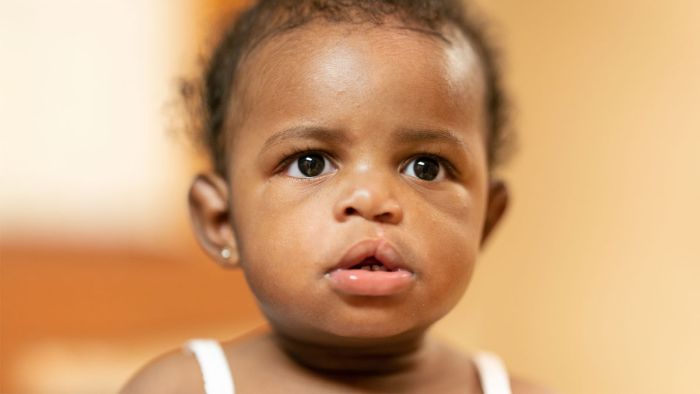New mothers Delissa Kearney and Janessa Erickson know what it’s like to hear your baby has a health condition before they’re even born. They’re both sharing their stories to support other parents who might find themselves receiving a diagnosis of cleft lip and/or palate for their baby.
Cleft lip (a separation in the upper lip) and cleft palate (a split in the roof of the mouth) are the most common types of conditions that affect the skull and face. Each year, the conditions affect about one in every 700 babies born in the United States, according to Cleftline.
No one knows exactly what causes clefts, but some medical specialists believe that family history and environmental factors (such as medications or vitamin deficiencies) might play a role.
Gillette Children’s has one of the largest craniofacial programs in the U.S. The Gillette craniofacial team includes craniofacial and pediatric plastic surgeons, neurosurgeons, dentists, orthodontists, speech-language pathologists, advanced practice nurse practitioners, audiologists, and other providers who’ve been carefully selected because of their specialized training.
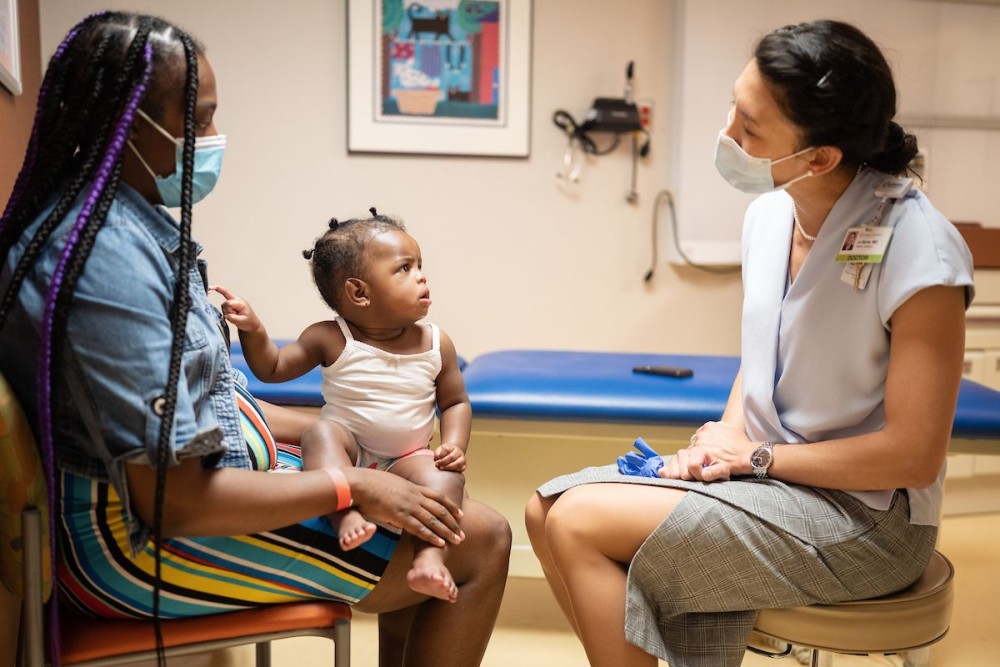
Delissa Kearney and her daughter Heavenly speak to Gillette pediatric plastic surgeon, Jo Barta, MD, during a post-surgical appointment for cleft lip repair.
"I prepared myself."
“I found out at the 20-week ultrasound for my daughter Heavenly,” Delissa Kearney recalls. “When I looked at the ultrasound screen I could see a gap in the mouth area for my daughter. I prepared myself.”
A doctor confirmed Kearney’s baby had a cleft lip and explained that this condition is often paired with a cleft palate.
“My first thought was to wonder if they could repair Heavenly’s lip before she was even born,” Kearney says.
Cleft lip and palate are not conditions that can be repaired in utero. Cleft lip repair typically occurs when babies are about 3 months old and usually requires only one reconstructive surgery. Cleft palate repair typically occurs when a baby is 9 to 12 months old.
Smile Bags and support at Gillette
After a specialty ultrasound confirmed Heavenly had a cleft lip, Kearney was referred to Gillette Children’s for a prenatal consultation to talk about Heavenly’s condition before birth.
During these consultations, the Gillette expert craniofacial team can provide information about treatment options, counseling, and can help plan a course of treatment.
Before cleft lip surgery, Gillette surgeons often recommend infants wear the OrthoCleft® appliance. It’s a device that can help improve your child’s outcome following surgery. The OrthoCleft is custom-molded to your baby’s mouth and looks similar to an orthodontic retainer. It can help to bring the gum segments together and reduce the size of the gap in the mouth while stretching lip muscles.
Gillette offers Smile Bags to new parents of children diagnosed with a cleft lip and/or palate. These tote bags contain a collection of tools and educational materials to support families. It’s a special way for the Gillette craniofacial team to support parents who might feel anxious and overwhelmed by their new baby’s diagnosis.
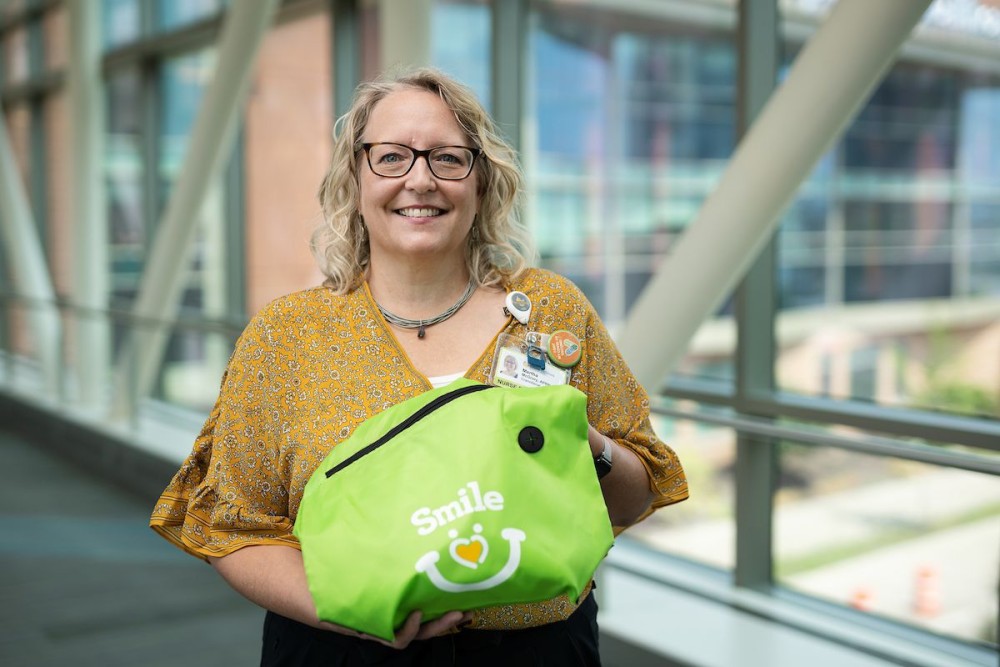
Gillette Children's advanced pediatric nurse practitioners, such as Martha McGrory, often hand out "Smile Bags" during consultations with parents who just received a diagnosis of cleft lip and/or palate for their baby. (photo taken before COVID-19)
We all want our babies to be "perfect"
“Right away the team at Gillette made me feel better,” Kearney recalls. “They explained the different bottles I would need to feed Heavenly properly and I appreciated their advice.” Kearney adds the Gillette craniofacial team understood her emotions and helped to reassure her.
“We all want our babies to be ‘perfect’ but sometimes that’s not the case,” Kearney says.
“When I gave birth to Heavenly I immediately asked about the severity of her cleft lip and palate,” Kearney recalls. “The doctor told me she had a cleft lip but her palate was fine. That was a surprise and a relief.”
Kearney is grateful she had her Gillette craniofacial team in place so she could work to help Heavenly right away.
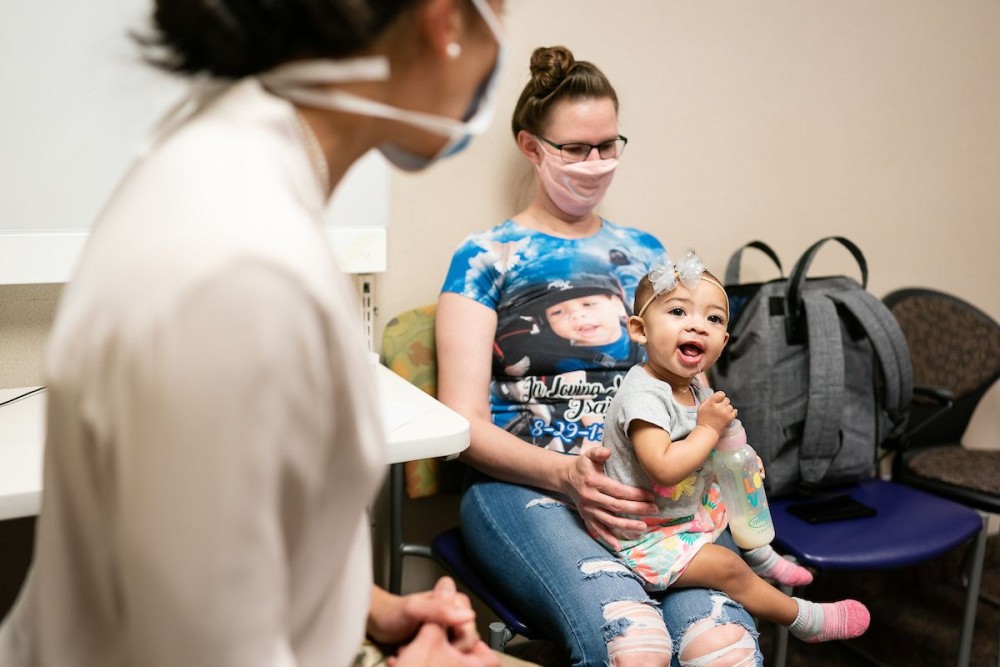
Janessa Erickson and her daughter, Robyn, travel regularly from Duluth, MN to meet with Dr. Barta.
An experienced mother's instincts
Janessa Erickson also received some surprising news at her baby’s 20-week ultrasound. At that time, she was living in Duluth, Minnesota.
“Robyn is my fifth child so I was familiar with what a baby should look like during the ultrasound,” Erickson says. “During the ultrasound I just knew there was something not quite right.”
A cleft lip and/or palate wasn’t the only surprise Erickson faced. That’s because Robyn was born a month early. The busy mother of now five children says she’s glad that immediately after Robyn’s birth she could begin working with Gillette craniofacial and plastic surgeon, Ruth “Jo” Barta, MD.
“There really are not many good options in Duluth for cleft lip and palate repair,” Erickson explains. “Robyn had surgery to repair her lip with Dr. Barta. I like how Dr. Barta explained things and made sure my child was getting the best care.”
Erickson worked with advanced pediatric nurse practitioner (APRN), Martha McGory, to learn about the special bottles and nipples that would make feeding easier for Robyn. Erikson credits the tips and relationships built with the Gillette team for Robyn’s successful feeding and strong overall health.
“When people see my daughter, they’re amazed at how great she looks,” Erickson marvels. “Everybody says Robyn looks great and, of course, I agree!”
She looks so nice
Delissa Kearney is also pleased with the results from her daughter’s surgery with Dr. Barta. Heavenly had surgery to repair her cleft lip in February 2022.
“She spent one night at Gillette and I was able to take her home the next day,” Kearney says. “She was a little swollen and wanted to be cuddled but everything healed well, and I only had to give her Tylenol for pain. The recovery from surgery was better than I expected.”
Kearney says Heavenly’s siblings were happy and surprised with how their sister looked after surgery.
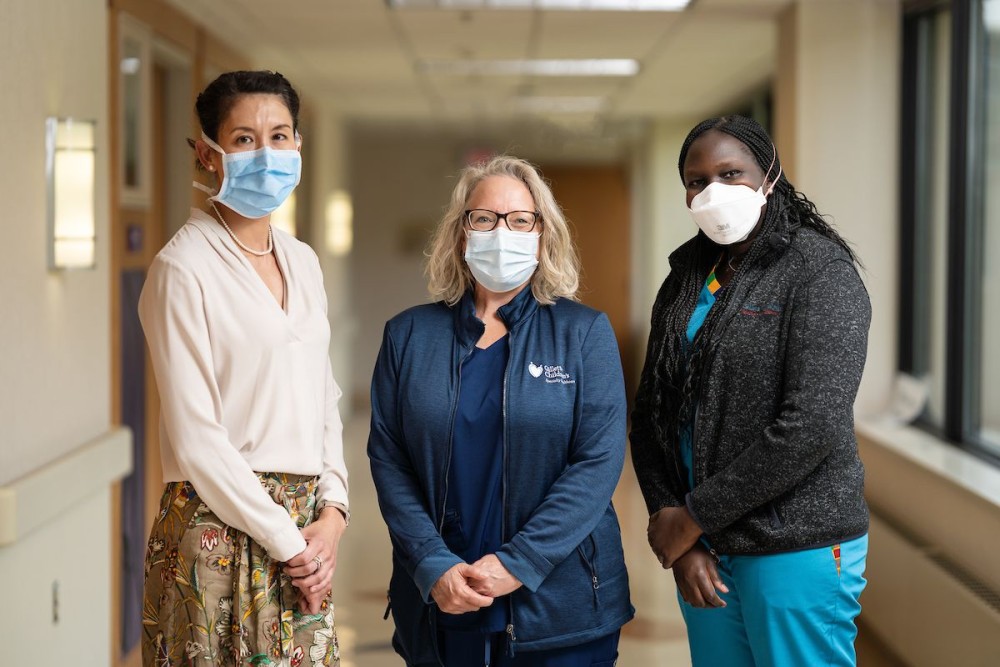
The expert craniofacial team at Gillette Children's includes pediatric craniofacial and plastic surgeon, Jo Barta, MD, advanced pediatric nurse practitioner, Martha McGrory, and registered nurse Ariat Ongach.
Support and research help with stress
Both Delissa Kearney and Janessa Erikson want to reassure parents who recently received a cleft lip and/or palate diagnosis that support and research can help ease stress.
“At first, I really did cry a lot,” Kearney admits. “That’s because I was worried about what it meant for my daughter, and I was concerned she would eventually face teasing at school. But Dr. Barta and the Gillette team were really helpful,” Kearney says.
“I would tell other parents to put your trust in these surgeons at Gillette. They see this all the time and they will help you realize that everything will turn out amazing.”
Janessa Erickson agrees and advises parents that a strong craniofacial team can help to alleviate stress and provide support.
“I’m a big believer that everything happens for a reason,” Erickson says. “My daughter is wonderful the way she is and I’m very happy with the result of her surgery and care at Gillette.”
Get Gillette Stories in your inbox!
Stay “in the know” with our Gillette Stories! Receive the latest stories and news from Gillette delivered straight to your inbox..
 Home Page
Home Page
